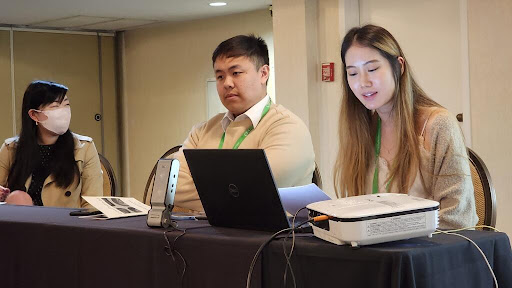
Graduate Research: Elizabeth Tran Wins Outstanding Graduate Student Paper Award
May 10, 2023
Elizabeth Tran (she/her)
Dual MA English/MFA Creative Writing ‘23
LinkedIn
Elizabeth Tran was awarded the Outstanding Graduate Student Paper Award for her paper titled, “Labor-Based and/or Rubric-Based? Examining the Effects of a Hybrid Grading System in the Composition Classroom” at this year’s College English Association (CEA) conference in San Antonio, Texas. This paper came out of an IRB-approved research project in English Professor Morgan Read-Davidson’s Fall 2022 ENG 582: Composition Pedagogy and Research Practicum.
For our latest Graduate Research feature, Tran discusses the research work that led to and informed her paper.
Originally from Los Angeles, CA, Elizabeth received her BA in Business Administration from UCI and is currently pursuing her MA in English/MFA in Creative Writing in Wilkinson College. She is also a Graduate Student Instructor of English 103: Rhetoric of Business. Her research is focused primarily on the Theories of Rhetoric and Composition Pedagogy, Young Adult Literature, and Asian American Studies. Aside from her scholarly work, Elizabeth is also working on a young adult speculative fiction novel, as well as a collection of short stories exploring the Asian American identity.
Voice of Wilkinson: What drove your initial interest in developing the research that would eventually lead to your research paper?
Elizabeth Tran: When I first started building the syllabus for my first-year composition course, I wasn’t sure if I wanted to proceed with a labor-based or rubric-based grading system. In our studies as Graduate Student Instructors, the use of rubrics was a heavily binarizing topic. In particular, we intensively discussed and analyzed the scholarship that argued for and against rubrics, with some researchers citing their merit, while many others pinpointed their limitations.
Many scholars found that traditional, rubric-based grading de-emphasized growth and targeted existing skills students already have. This is especially true for students who have “excelled” at writing essays in the past. Because their experience has shown them that they can earn a good grade by strictly following the rubric, these students will not push themselves to be innovative or to take risks in their writing, which in turn, hinders their process to becoming better writers. This is also true for students who are not “good” writers. Their past negative experiences with writing can discourage them from even trying, since they do not think they can ever do better. As such, when a rubric exists, students tend to erroneously focus on turning in a product that meets all the rubric’s criteria, instead of focusing on the writing process and their improvement as rhetoricians.
Labor-based grading, on the other hand, is cited by many scholars as a more “equitable” form of assessment that addresses students’ fixation on the final product and shifts their focus away from the output, so that they concentrate more on the process. However, labor-based grading methods are still unfair to certain students and may not be as objective as we think it is. Labor, in labor-based grading, is oftentimes determined by the amount of time a student spends on a task or assignment. However, not all students are full-time students with no other job-related responsibilities or familial obligations. In adopting a labor-based contract grading system, which is heavily reliant on time spent completing class activities, a labor-based grading system is still unfair to certain students, even though its initial intentions were not malicious.
“Both labor-based and rubric-based grading methods fail to account for classroom ecology. With this in mind, I modified and combined elements from both labor-based and rubric-based grading to create a hybrid assessment system that encourages process pedagogy, which in turn, helps students improve as writers.”
VoW: Tell us about your paper/research project “Labor-Based and/or Rubric-Based? Examining the Effects of a Hybrid Grading System in the Composition Classroom.”
ET: The use of rubrics remains a heavily binarizing topic in writing studies pedagogy. Do students find a labor-based grading system liberating? Or do students feel comforted by a clear and well-articulated rubric because they provide a level of familiarity? Most importantly, which grading system is truly “better?” Or are there pros and cons of each?
To better understand that tension, I conducted an ethnographic study of first-year composition students’ lived experiences in a classroom that incorporated a hybrid grading system. Drawing from the long history of research in grading methodology, and more specifically, the studies surrounding grading discontent, new forms of assessment, and the limitations of rubrics, my first-year composition class utilized a hybrid grading system, which employed labor-based grading to assess a number of assignments and rubric-based grading to assess select others. As such, I was able to closely observe students’ receptions of a hybrid grading system to see how it affected their perceptions of writing in the long run and whether this encouraged them to become “better” writers.
VoW: What were some key takeaways from your hybrid system of grading?
ET: I hoped to encourage students to focus less on their grades and more on the writing and revision process. Additionally, in completing my ethnographic study, I was able to see how process pedagogy and various other pedagogical approaches that stress labor played out in a first-year composition course. Ultimately, this allowed me to examine how a hybrid grading system altered my students’ perceptions of writing and their identities as writers, especially since they have been conditioned to write based on a rigid set of guidelines.
Following the analysis of my data, I have discovered that there is no superior assessment method. Rather, both rubric-based and labor-based grading have their distinct pros and cons. Furthermore, there is no one-size-fits-all approach to grading methodology since every student learns differently. As a result, we as instructors must be aware of our own classroom ecology and our students’ preferred learning methods in order to build a classroom environment that will best help them become more effective rhetoricians. In conclusion, a hybrid grading system—one that incorporates process pedagogy and clear instructions that students associate with rubrics—may be the most beneficial to students, as this type of grading methodology allows instructors to incorporate the positive aspects of both rubric-based and labor-based grading.
Though my research is far from perfect, I believe this ethnographic study still adds to the writing studies discipline through my examination of how a hybrid system works in a writing classroom, and most importantly, how it positively affects students’ perceptions of writing and their role as writers.
“Ultimately, by analyzing the theories I used to build my class, I have discovered that a hybrid grading system encourages students to take more risks in their writing, to focus more on the process of becoming a better writer, and most notably, to not fear failure when it comes to writing.”
VoW: What most surprised you about your research?
ET: I was most surprised by how much this work has inspired me to become a better instructor. When I first started teaching as a Graduate Student Instructor, I wasn’t sure how I’d be able to positively impact my students and encourage them to become better writers, but now that I’ve completed this research project, I feel more confident in the design of my course and syllabus. I also understand my students a lot more, and I think this study has shown me that we as instructors can keep growing and adjusting because our goal is to help our students learn and become the best scholars that they can be.
My research project and paper has definitely changed from its initial inception, and that’s all thanks to Professor Morgan Read-Davidson, who is the Director of Undergraduate Writing Programs. He’s been monumental in helping me develop my ideas, and he was also the one who encouraged me to apply for and attend CEA.
Congratulations, Elizabeth Tran!


